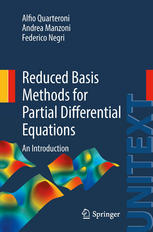

Most ebook files are in PDF format, so you can easily read them using various software such as Foxit Reader or directly on the Google Chrome browser.
Some ebook files are released by publishers in other formats such as .awz, .mobi, .epub, .fb2, etc. You may need to install specific software to read these formats on mobile/PC, such as Calibre.
Please read the tutorial at this link: https://ebookbell.com/faq
We offer FREE conversion to the popular formats you request; however, this may take some time. Therefore, right after payment, please email us, and we will try to provide the service as quickly as possible.
For some exceptional file formats or broken links (if any), please refrain from opening any disputes. Instead, email us first, and we will try to assist within a maximum of 6 hours.
EbookBell Team

4.7
86 reviewsThis book provides a basic introduction to reduced basis (RB) methods for problems involving the repeated solution of partial differential equations (PDEs) arising from engineering and applied sciences, such as PDEs depending on several parameters and PDE-constrained optimization.
The book presents a general mathematical formulation of RB methods, analyzes their fundamental theoretical properties, discusses the related algorithmic and implementation aspects, and highlights their built-in algebraic and geometric structures.
More specifically, the authors discuss alternative strategies for constructing accurate RB spaces using greedy algorithms and proper orthogonal decomposition techniques, investigate their approximation properties and analyze offline-online decomposition strategies aimed at the reduction of computational complexity. Furthermore, they carry out both a priori and a posteriori error analysis.
The whole mathematical presentation is made more stimulating by the use of representative examples of applicative interest in the context of both linear and nonlinear PDEs. Moreover, the inclusion of many pseudocodes allows the reader to easily implement the algorithms illustrated throughout the text. The book will be ideal for upper undergraduate students and, more generally, people interested in scientific computing.
All these pseudocodes are in fact implemented in a MATLAB package that is freely available at https://github.com/redbkit